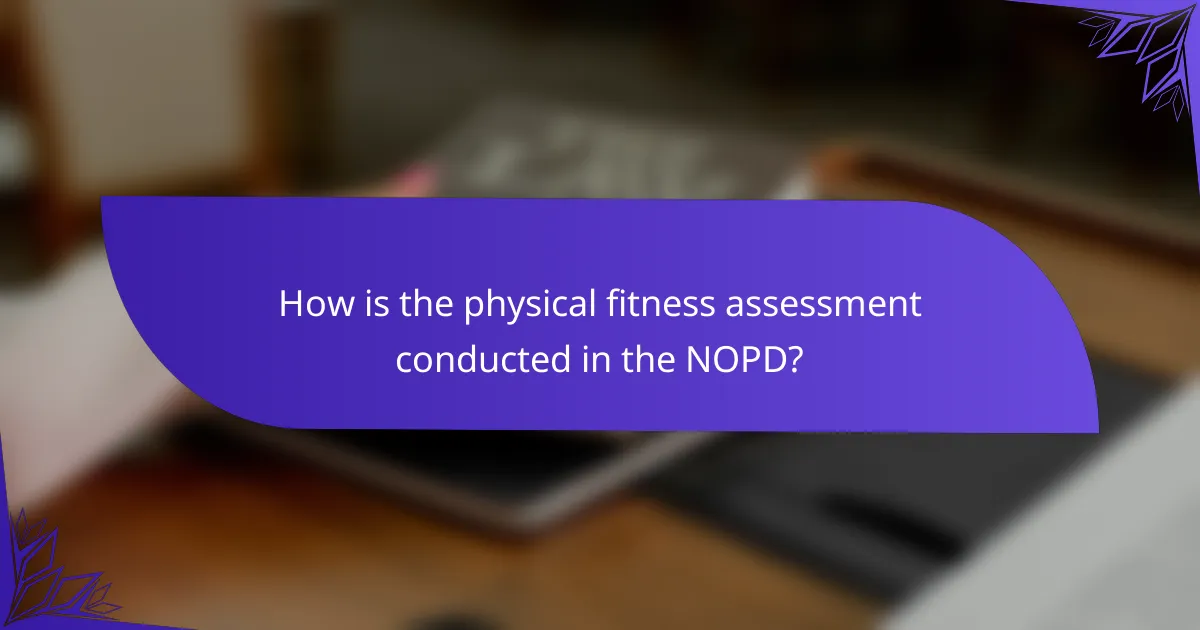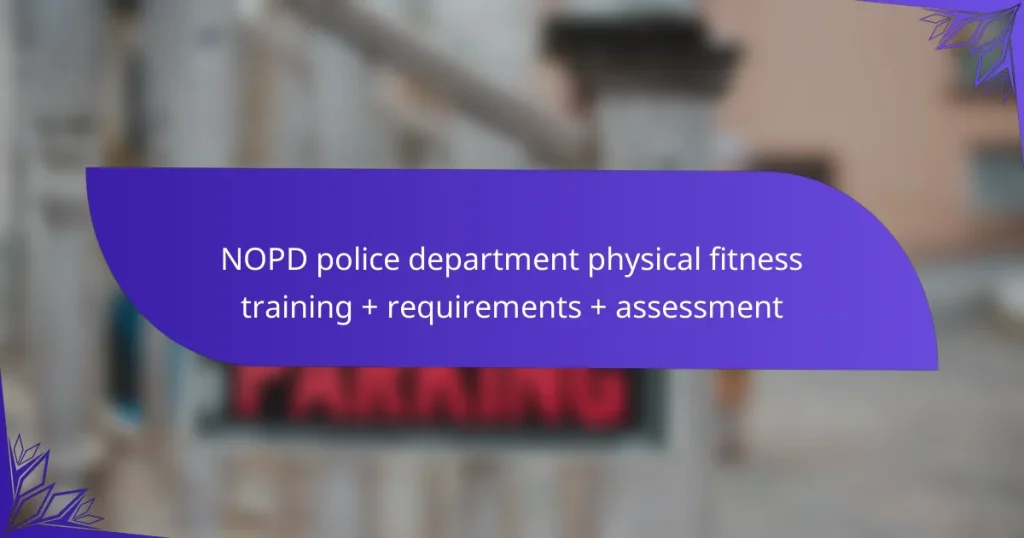
What is the NOPD Police Department Physical Fitness Training?
The NOPD Police Department Physical Fitness Training is a structured program designed to enhance the physical readiness of police officers. This training focuses on building strength, endurance, and overall fitness. It includes various exercises and activities tailored to meet the demands of law enforcement duties. The program aims to prepare officers for the physical challenges they may encounter in the field. Additionally, it incorporates assessments to evaluate fitness levels and progress. These assessments ensure that officers maintain the necessary physical standards required for their roles. Overall, the training is essential for promoting officer safety and effectiveness.
How is physical fitness training structured within the NOPD?
Physical fitness training within the NOPD is structured around a comprehensive program designed to enhance officer readiness. The training includes various components such as cardiovascular conditioning, strength training, and flexibility exercises. Officers participate in regular fitness assessments to evaluate their physical capabilities. These assessments often include timed runs, push-ups, and sit-ups. The program is tailored to meet the specific demands of law enforcement duties. It emphasizes the importance of maintaining a healthy lifestyle. Training sessions are conducted both individually and in groups to foster teamwork. Overall, the structure aims to ensure that officers are physically prepared for the challenges they may face on duty.
What are the key components of the NOPD’s physical fitness training program?
The key components of the NOPD’s physical fitness training program include cardiovascular endurance, strength training, flexibility, and agility exercises. Cardiovascular endurance is developed through activities such as running and cycling. Strength training focuses on bodyweight exercises and resistance training to enhance muscular fitness. Flexibility is improved through stretching routines that promote joint health. Agility exercises involve drills that enhance quickness and coordination. These components are designed to prepare officers for the physical demands of their duties. The program emphasizes overall fitness to ensure officers can respond effectively in various situations.
How often do NOPD recruits participate in physical fitness training?
NOPD recruits participate in physical fitness training daily. This training is a crucial part of their overall preparation. Recruits engage in various exercises to build strength and endurance. The daily regimen includes cardiovascular workouts, strength training, and agility drills. This structured approach helps recruits meet the physical demands of law enforcement. Regular assessments ensure recruits are progressing in their fitness levels. Consistent training fosters teamwork and discipline among recruits. Overall, daily physical fitness training is essential for NOPD recruits’ success.
What are the objectives of the NOPD’s physical fitness training?
The objectives of the NOPD’s physical fitness training are to enhance overall physical readiness and improve job performance. This training aims to prepare officers for the physical demands of law enforcement duties. It focuses on building strength, endurance, and flexibility. Officers are trained to effectively handle various situations they may encounter. The program also emphasizes injury prevention and health maintenance. Regular assessments ensure that officers meet fitness standards. These objectives align with the department’s commitment to public safety and officer wellness.
How does physical fitness training impact officer performance?
Physical fitness training significantly enhances officer performance. It improves physical capabilities such as strength, endurance, and agility. Enhanced fitness levels lead to better reaction times in critical situations. Officers with higher fitness levels demonstrate improved decision-making under stress. A study by the International Association of Chiefs of Police found that physically fit officers are less prone to injuries. This reduces time off work and promotes overall department efficiency. Additionally, fitness training fosters teamwork and camaraderie among officers. This contributes to a more cohesive and effective law enforcement unit.
What role does physical fitness play in overall police work?
Physical fitness plays a critical role in overall police work. It enhances officers’ ability to perform demanding tasks effectively. High levels of fitness improve endurance, strength, and agility. These attributes are essential during physical confrontations or emergencies. Research indicates that physically fit officers experience lower injury rates. According to the International Association of Chiefs of Police, fitness training can reduce stress and improve mental health. Furthermore, physical fitness fosters a positive community image for law enforcement agencies. Overall, fitness is integral to operational readiness and public safety.

What are the requirements for physical fitness training in the NOPD?
The requirements for physical fitness training in the NOPD include passing a physical fitness assessment. This assessment typically consists of several components such as running, push-ups, and sit-ups. Candidates must meet specific performance standards for each component. The standards are designed to ensure that recruits can perform the physical demands of police work. Regular fitness training is also emphasized for current officers to maintain their physical readiness. Documentation of fitness progress may be required to track improvements over time. These requirements help ensure that NOPD officers are fit for duty and able to respond effectively to various situations.
What are the baseline fitness standards for NOPD recruits?
The baseline fitness standards for NOPD recruits include specific physical performance benchmarks. Recruits must complete a 1.5-mile run in under 15 minutes and 30 seconds. Additionally, they are required to perform at least 30 push-ups in one minute. Recruits must also complete a minimum of 30 sit-ups in one minute. These standards ensure that recruits possess the necessary physical capabilities for police work. Meeting these benchmarks is crucial for successful recruitment into the NOPD.
How are these fitness standards determined?
Fitness standards for the NOPD police department are determined through a combination of research, expert recommendations, and real-world performance data. These standards are designed to ensure that officers meet the physical demands of their duties. Research studies on law enforcement fitness have established benchmarks for strength, endurance, and agility. Additionally, expert panels often review these studies to create criteria that reflect the specific needs of police work. The standards are regularly updated based on new findings and the evolving nature of policing. This approach helps maintain a high level of fitness among officers, ensuring they are prepared for the challenges they may face in the field.
What specific exercises are included in the fitness assessment?
The specific exercises included in the fitness assessment are the 1.5-mile run, push-ups, sit-ups, and a vertical jump test. The 1.5-mile run measures cardiovascular endurance. Push-ups assess upper body strength. Sit-ups evaluate core strength and endurance. The vertical jump test measures explosive leg power. These exercises are standard in many police fitness assessments. They provide a comprehensive overview of an individual’s physical capabilities.
What are the age and health requirements for recruits?
Recruits for the NOPD must be between 21 and 35 years old. This age range ensures that candidates are mature and physically capable. Health requirements include passing a medical examination. The examination assesses overall fitness and any pre-existing conditions. Recruits must also meet specific vision and hearing standards. These standards ensure that candidates can perform their duties effectively. Additionally, recruits must not have any disqualifying medical conditions. This ensures the safety and performance of the recruit in training and on duty.
How does age affect physical fitness expectations?
Age affects physical fitness expectations by influencing strength, endurance, and recovery rates. As individuals age, muscle mass typically declines. This can result in decreased strength and power. Additionally, cardiovascular endurance often diminishes with age. Older adults may experience longer recovery times after exercise. Research shows that peak physical performance generally occurs in the late 20s to early 30s. After this age, fitness levels may gradually decline without consistent training. Therefore, age-specific fitness benchmarks are essential for accurate assessment and training in police departments.
What health screenings are required before training?
Health screenings required before training include a comprehensive physical examination. This examination assesses overall health and identifies any potential medical issues. Blood pressure checks are also necessary to ensure cardiovascular health. Additionally, vision and hearing tests may be required to confirm sensory capabilities. A drug screening is often mandated to ensure compliance with regulations. These screenings help to minimize health risks during training. They are essential for the safety and readiness of trainees.

How is the physical fitness assessment conducted in the NOPD?
The physical fitness assessment in the NOPD is conducted through a series of standardized tests. These tests typically include a 1.5-mile run, sit-ups, and push-ups. Each component measures different aspects of physical fitness. The run assesses cardiovascular endurance. Sit-ups evaluate core strength and endurance. Push-ups measure upper body strength. Candidates must meet specific performance benchmarks to pass the assessment. These benchmarks are set based on departmental standards. The assessment is usually administered at designated training facilities. Results are recorded and reviewed by fitness coordinators.
What does the physical fitness assessment entail?
A physical fitness assessment evaluates an individual’s physical capabilities. It typically includes tests for cardiovascular endurance, muscular strength, flexibility, and body composition. Common assessments involve running, push-ups, sit-ups, and flexibility exercises. These tests measure how well the body performs specific physical tasks. The results help determine fitness levels and readiness for physical demands. Accurate assessments are crucial for ensuring candidates meet the physical requirements. They also guide training programs tailored to improve fitness levels.
What specific tests are included in the assessment process?
The assessment process for the NOPD police department includes specific physical fitness tests. These tests evaluate the candidate’s strength, endurance, and agility. Common tests include the 1.5-mile run, push-ups, and sit-ups. The 1.5-mile run measures cardiovascular endurance. Push-ups assess upper body strength, while sit-ups evaluate core strength. Each test has established standards for successful completion. Candidates must meet or exceed these standards to pass the assessment.
How is performance measured in each component of the assessment?
Performance in each component of the NOPD police department physical fitness assessment is measured through specific tests. The assessment includes components such as the 1.5-mile run, push-ups, and sit-ups.
For the 1.5-mile run, performance is measured by the time taken to complete the distance. A standard benchmark is set for passing based on age and gender.
Push-ups are measured by the total number completed in one minute. A minimum number of repetitions is required to pass the test.
Sit-ups are also measured by the total number completed in one minute. Similar to push-ups, a minimum number is established for passing.
These performance metrics are standardized to ensure fairness and consistency across all candidates.
What happens if a recruit fails the physical fitness assessment?
If a recruit fails the physical fitness assessment, they may be given the opportunity to retake the assessment. The NOPD typically allows recruits to improve their fitness levels before a re-evaluation. Failure to pass the assessment can lead to delays in the training process. If a recruit fails multiple attempts, they may face dismissal from the training program. This policy helps ensure that all recruits meet the necessary physical standards for police work. The assessment is crucial for maintaining the overall fitness and readiness of law enforcement personnel.
What opportunities are available for retesting?
Retesting opportunities for the NOPD police department physical fitness assessment are available for candidates who do not pass the initial test. Candidates can schedule a retest after a defined period, typically set by the department. This allows individuals to improve their physical fitness before attempting the assessment again. The specific timeline for retesting may vary based on departmental policies. Candidates are encouraged to utilize training resources offered by the department to enhance their performance. Furthermore, retesting ensures that all candidates meet the required physical standards for duty.
How does failure impact overall training progression?
Failure negatively impacts overall training progression by hindering skill acquisition and confidence. When individuals fail to meet specific training objectives, it can lead to decreased motivation. This decline in motivation may result in reduced effort during subsequent training sessions. Moreover, repeated failures can create a fear of failure, which further inhibits performance.
Research indicates that failure can also lead to a fixed mindset, where individuals believe their abilities are static. This mindset can prevent them from seeking improvement strategies. In contrast, those who view failure as a learning opportunity tend to adapt and enhance their skills.
Therefore, addressing failure constructively is essential in training environments, especially in high-stakes fields like law enforcement. Emphasizing resilience and adaptive learning can mitigate the negative effects of failure on training progression.
What are some best practices for succeeding in NOPD physical fitness training?
To succeed in NOPD physical fitness training, individuals should maintain a consistent workout routine. Regular training enhances endurance, strength, and agility. Incorporating a mix of cardiovascular exercises and strength training is essential. Activities like running, swimming, and circuit training can improve overall fitness levels. Proper nutrition plays a crucial role in performance. Consuming a balanced diet with adequate protein supports muscle recovery and energy levels. Staying hydrated is vital during training sessions. Adequate rest and recovery time also contribute to improved performance. Engaging in practice assessments familiarizes trainees with the physical fitness test requirements. Setting specific, measurable goals helps track progress effectively.
How can recruits prepare effectively for the physical fitness assessment?
Recruits can prepare effectively for the physical fitness assessment by following a structured training program. This program should include cardiovascular exercises, strength training, and flexibility workouts. Cardiovascular exercises, such as running and cycling, enhance endurance. Strength training builds muscle required for physical tasks. Flexibility workouts, like stretching, improve range of motion and prevent injuries.
Recruits should also familiarize themselves with the specific assessment requirements. Knowing the standards helps in setting realistic goals. Consistent practice of the assessment components is crucial. This includes push-ups, sit-ups, and running timed distances. Nutrition plays a vital role in preparation. A balanced diet fuels workouts and aids recovery.
Rest and recovery are equally important. Adequate sleep enhances performance and reduces fatigue. Mental preparation can boost confidence. Visualization techniques help recruits mentally rehearse the assessment. Following these guidelines can lead to improved performance in the physical fitness assessment.
What resources are available to support physical fitness training for NOPD recruits?
NOPD recruits have access to various resources for physical fitness training. The department provides a structured physical training program. This program includes strength and conditioning sessions. Recruits also utilize fitness facilities equipped with modern exercise equipment. Additionally, personal training sessions are available to enhance individual fitness levels. The NOPD offers access to fitness assessments to monitor progress. Training materials and resources are provided to educate recruits on effective exercise techniques. Finally, recruits benefit from guidance by experienced trainers and fitness professionals.
The NOPD Police Department Physical Fitness Training is a comprehensive program aimed at enhancing the physical readiness of police officers through structured exercises that build strength, endurance, and overall fitness. Key components include cardiovascular conditioning, strength training, flexibility, and agility exercises, with daily participation required for recruits. The training incorporates regular fitness assessments to evaluate performance against established benchmarks, ensuring that officers meet the physical demands of their duties. The article outlines the program’s objectives, the specific requirements for recruits, and the assessment process, emphasizing the critical role of physical fitness in effective law enforcement.




